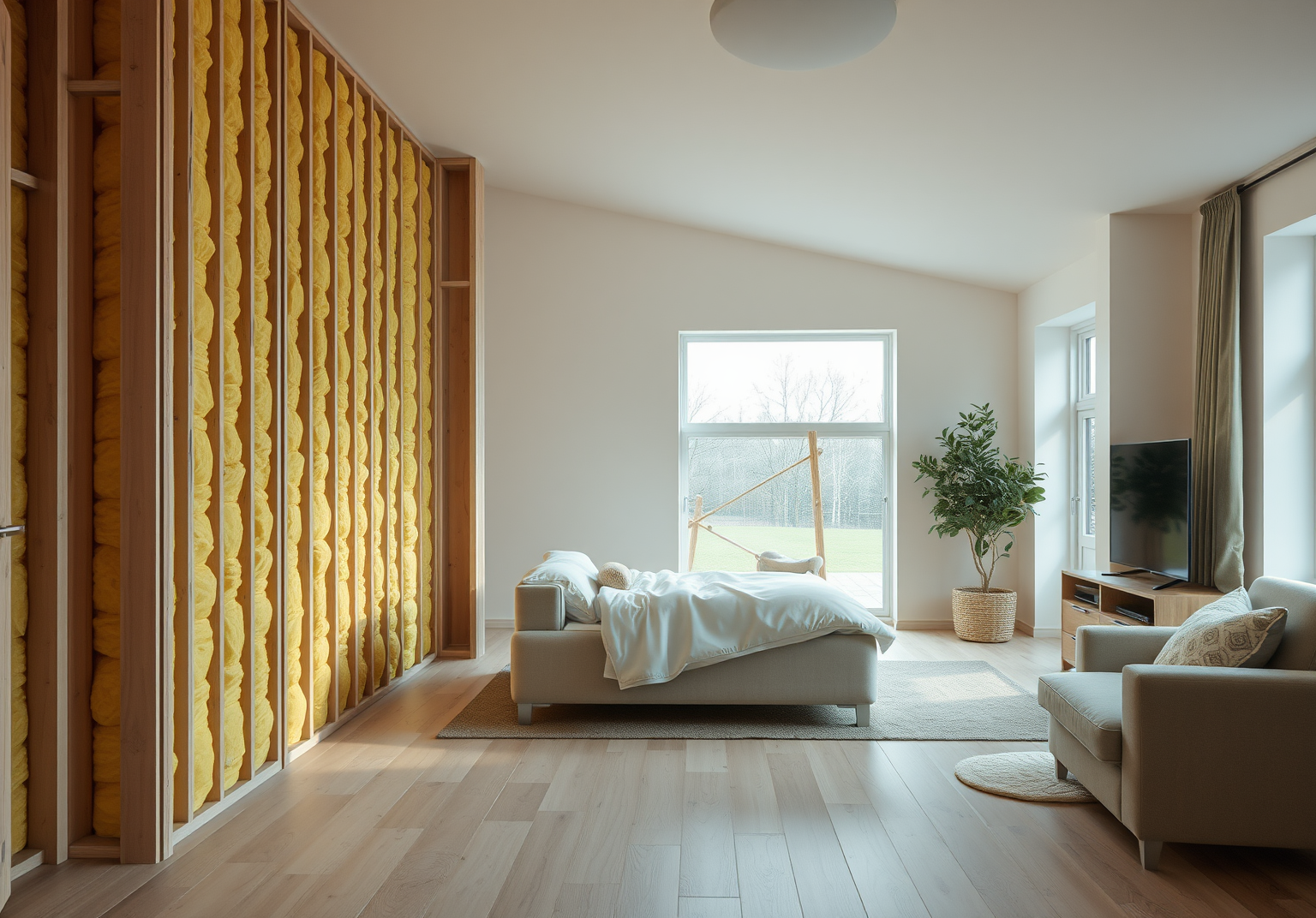Insulation in Home Renovation: The Complete Guide to Reducing Energy Waste
Introduction
When it comes to home renovation in the Netherlands, one of the most critical aspects to consider is insulation. Proper insulation not only enhances the comfort of your living space but also significantly reduces energy costs and contributes to a more sustainable environment. In this comprehensive guide, we will delve into the importance of insulation, the different types available, and how to incorporate it into your home renovation project in the Netherlands.
Basic Concepts
What is Insulation?
Insulation is a material or system used to reduce the flow of heat, sound, or electricity. In the context of home renovation, insulation is primarily used to improve thermal and acoustic comfort.
Types of Insulation
- Thermal Insulation: This type of insulation restricts heat transfer, keeping your home warmer in winter and cooler in summer. Common materials include fiberglass, foam, cellulose, and mineral wool.
- Acoustic Insulation: Designed to restrict sound transfer or sound reverberation, acoustic insulation is crucial for reducing noise pollution. Materials like wood fiber insulation and acoustic drywall are effective in this regard.
Benefits of Insulation
Energy Savings
Insulation can save you up to 30% on your energy bills, according to Milieu Centraal. This significant reduction in energy consumption means the cost of insulation will pay for itself over time through the savings on your energy bills.
Comfortable Living Environment
Proper insulation helps regulate temperature and humidity levels, creating a more comfortable and enjoyable living space. It also reduces drafts and maintains a consistent indoor temperature.
Noise Reduction
Insulation acts as an effective sound barrier, reducing noise pollution and creating a quieter living environment. This is particularly important in urban areas where external noise can be a significant issue.
Environmental Benefits
By reducing the amount of energy used to heat and cool your home, insulation helps lower greenhouse gas emissions and protect the environment. This aligns with the Netherlands’ commitment to sustainability and reducing its environmental impact.
Increased Property Value
A well-insulated home is more attractive to potential buyers, increasing its resale value. This makes insulation a smart investment for homeowners looking to enhance their property’s value.
Sections of the Article
Assessing Your Home’s Insulation Needs
Before starting any insulation project, it is essential to assess your property to understand its specific insulation needs. Here are some steps to follow:
- Initial Consultation and Assessment: Work with a professional to examine your existing insulation, identify any problem areas, and discuss your energy efficiency goals.
- Identify Problem Areas: Look for gaps, cracks, and areas where heat or sound might be escaping. Common problem areas include attics, basements, and walls.
Choosing the Right Insulation
Selecting the right insulation material is crucial for achieving your energy efficiency and comfort goals.
- Thermal Insulation Materials:
- Fiberglass
- Foam
- Cellulose
- Mineral wool
These materials vary in cost, R-value, and eco-friendliness. Choose based on your budget, energy needs, and the climate in your area[1][5].
- Acoustic Insulation Materials:
- Wood fiber insulation
- Acoustic drywall
- Soundproof batts
These materials are designed to be denser and more effective at absorbing sound waves.
Professional Installation
Ensure that the insulation is installed by skilled professionals to guarantee optimal performance.
- Wall Insulation: Insulate walls, including external and internal walls, to prevent heat loss and reduce noise transmission.
- Roof and Floor Insulation: Insulate roofs and floors to maintain consistent indoor temperatures and reduce energy consumption.
- Critical Areas: Pay special attention to critical areas like attics and basements, which are often poorly insulated.
Integration with Sustainable Renovation Practices
Sustainable renovation practices are increasingly popular in the Netherlands, and insulation plays a key role in these efforts.
- Energy Efficiency: Improving insulation in walls, roofs, and floors is crucial for maintaining energy efficiency. This includes using high-quality insulation materials and ensuring proper installation[2].
- Renewable Energy Sources: Integrating renewable energy sources like solar panels and heat pumps can further enhance the energy efficiency of your home[2].
- Government Incentives: The Dutch government offers various incentives and subsidies for energy-efficient renovations, including insulation upgrades. These can include grants, tax incentives, or low-interest loans.
Practical Tips for Insulating Your Home
Here are some practical tips to consider when insulating your home in the Netherlands:
- Explore Government Incentives: Take advantage of the various incentives and subsidies offered by the Dutch government for energy-efficient renovations.
- Maintain Your Insulation: After installation, maintain your insulation to maximize energy efficiency. Seek ongoing support and advice from your insulation contractor.
- Upgrade Windows and Doors: Upgrading to energy-efficient windows and doors, such as double or triple glazing, can significantly improve insulation and reduce noise pollution.
Case Studies and Examples
Wood Fiber Insulation
Wood fiber insulation is an eco-friendly option that is exceptional for both thermal and acoustic insulation. When professionally installed, it can replace or augment existing insulation in walls, roofs, and floors. This material is dense and porous, allowing it to effectively absorb sound waves and reduce noise transmission.
Acoustic Drywall
Acoustic drywall is a specialized product designed to dampen sound. It is denser than regular drywall and often includes layers of sound-dampening materials. When installed, it can substantially reduce the transmission of sound through walls and ceilings.
Conclusion
Insulating your home in the Netherlands is a smart investment that can save you money, enhance your comfort, reduce noise pollution, and contribute to a more sustainable environment. By understanding the different types of insulation, complying with local regulations, and following practical tips, you can ensure that your home renovation project is both energy-efficient and comfortable.
Summary of Key Points
- Energy Savings: Insulation can save up to 30% on energy bills.
- Comfort: Proper insulation regulates temperature and humidity levels.
- Noise Reduction: Insulation acts as an effective sound barrier.
- Environmental Benefits: Insulation helps lower greenhouse gas emissions.
- Increased Property Value: Well-insulated homes are more attractive to buyers.
- Professional Installation: Ensure insulation is installed by skilled professionals.
- Integration with Sustainable Practices: Insulation is crucial for sustainable renovation efforts.
Don’t hesitate to contact a professional insulation contractor to start your journey towards a warmer, greener future. With the right insulation solutions, you can enjoy a more comfortable, energy-efficient, and sustainable home in the Netherlands.










